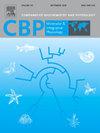Multi-omics-based study on metabolic-physiological response to heat stress in rainbow trout (Oncorhynchus mykiss)
IF 2.2
3区 生物学
Q4 BIOCHEMISTRY & MOLECULAR BIOLOGY
Comparative Biochemistry and Physiology A-Molecular & Integrative Physiology
Pub Date : 2025-07-08
DOI:10.1016/j.cbpa.2025.111903
引用次数: 0
Abstract
Global warming poses a critical survival challenge for cold-water economic fish, necessitating elucidation of their physiological and metabolic responses to heat stress. This study established a rainbow trout heat stress model using a gradual temperature increase protocol (from 16 °C to 20 °C over 8 days, followed by maintenance at 20 °C for 22 days) and investigated the adverse effects and adaptive strategies of rainbow trout under heat stress. Extensive congestion and steatosis observed in liver tissues suggested that heat stress induced inflammatory responses and dysregulation of lipid metabolism. Significant increases in antioxidant enzyme activities and reactive oxygen species levels (1.29-fold) indicated activation of the antioxidant defense system, and this response was insufficient to alleviate oxidative damage. Integrative transcriptomic and metabolomic analyses revealed that lipid metabolism was the most significantly altered biological process. Elevated prostaglandin D2 (1.64-fold change), driven by disruption of arachidonic acid metabolism, triggered inflammatory responses. Adaptive upregulation of linoleic acid and α-linolenic acid metabolism likely maintained membrane fluidity, enhancing the capacity for heat stress adaptation. Concurrently, adaptive activation of both GPX4A (6.73-fold change) and the heat shock proteins (LOC118938277 and hsp47) likely mitigated oxidative damage associated with heat stress in the liver. Overall, this study advances the understanding of pathological injuries and adaptive strategies in rainbow trout under heat stress and identifies candidate genes for breeding heat-tolerant strains.

虹鳟(Oncorhynchus mykiss)热应激代谢生理反应的多组学研究
全球变暖对冷水经济鱼类的生存提出了严峻的挑战,有必要阐明它们对热应激的生理和代谢反应。本研究采用逐渐升温方案(从16 °C到20 °C,持续8 天,然后维持在20 °C,持续22 天)建立了虹鳟鱼热应激模型,并研究了虹鳟鱼在热应激下的不利影响和适应策略。肝组织广泛充血和脂肪变性表明热应激诱导炎症反应和脂质代谢失调。抗氧化酶活性和活性氧水平的显著增加(1.29倍)表明抗氧化防御系统被激活,但这种反应不足以减轻氧化损伤。综合转录组学和代谢组学分析显示,脂质代谢是最显著改变的生物过程。由于花生四烯酸代谢紊乱,前列腺素D2升高(变化1.64倍),引发炎症反应。亚油酸和α-亚麻酸代谢的适应性上调可能维持了膜的流动性,增强了对热应激的适应能力。同时,GPX4A(6.73倍变化)和热休克蛋白(LOC118938277和hsp47)的适应性激活可能减轻肝脏中与热应激相关的氧化损伤。总的来说,本研究促进了对虹鳟鱼在热胁迫下的病理损伤和适应策略的理解,并确定了耐热品系的候选基因。
本文章由计算机程序翻译,如有差异,请以英文原文为准。
求助全文
约1分钟内获得全文
求助全文
来源期刊
CiteScore
5.00
自引率
4.30%
发文量
155
审稿时长
3 months
期刊介绍:
Part A: Molecular & Integrative Physiology of Comparative Biochemistry and Physiology. This journal covers molecular, cellular, integrative, and ecological physiology. Topics include bioenergetics, circulation, development, excretion, ion regulation, endocrinology, neurobiology, nutrition, respiration, and thermal biology. Study on regulatory mechanisms at any level of organization such as signal transduction and cellular interaction and control of behavior are also published.

 求助内容:
求助内容: 应助结果提醒方式:
应助结果提醒方式:


